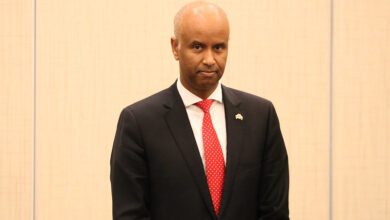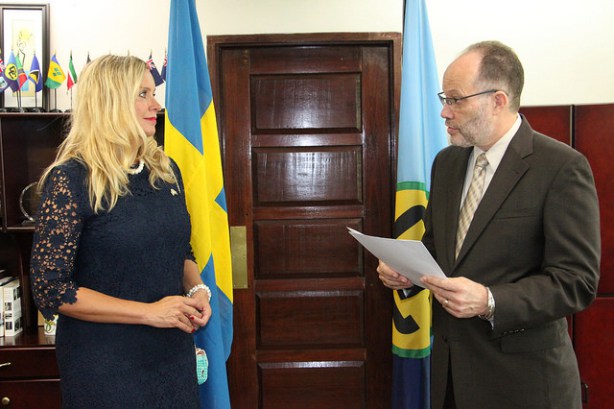“In the Caribbean Community (CARICOM), we have seen the rise of formidable women leaders in government, the private sector and civil society, yet women remain underrepresented in formal political institutions and upper management roles. Only 2 of our 15 Member States – Barbados, and Trinidad and Tobago – have a woman as Head of Government at this time. We are expecting another to be installed as Head of State and Government next month in Suriname. Only one of our Member States, Guyana, has implemented a 30% gender quota for women in parliament.” – Dr. Carla Barnett, CARICOM Secretary-General
Dr. Carla Barnett, CARICOM Secretary-General, delivered remarks at the Caribbean Women’s Leadership Conference held in Christ Church, Barbados, 18 June 2025.
Please read her remarks below:
- Ms. Nana Oye Hesse-Bayne, President of the Regional Board of Directors, and Other Members of the Board of CIWiL;
- [Members of National Chapters from Across the Region;]
- Representatives of Government of Barbados [and Other Regional Governments];
- Representatives of International Development Partners [especially those Supporting CIWiL and this Event];
- Business and Civil Society Representatives;
- Gender Equality Advocates;
- Other Distinguished Delegates;
- Ladies and Gentlemen.
I am pleased to have been invited to address this year’s Caribbean Women’s Leadership Conference. CIWiL is an organisation I support and came to know quite well when the first moves were made to establish the Belize Chapter in 2018. COVID-19 and other issues intervened, but in 2020, the Chapter was formally established. Needless to say, I support the mission and work of the organisation and welcome this opportunity to dialogue with you.
As the global community observes the Thirtieth Anniversary of the Fourth World Conference on Women and the adoption of the Beijing Declaration and Platform for Action, we are reminded of our enduring commitment to the principles and goals of the most comprehensive roadmap to achieve gender equality.
It is appropriate and timely that this Conference is focusing attention on one of the 12 critical areas of concern in the Beijing Declaration, that of “Women in Power and Decision Making”.
This remains as urgent today as it was three decades ago.
The Beijing Declaration challenged governments and societies to ensure women’s full and equal participation in political and economic leadership. Thirty years on, we must reflect on both progress and persistent gaps.
Globally, women have made some strides. Research from the Inter-Parliamentary Union, which regularly publishes data on participation of women in national parliaments, shows that as of 2024, women hold approximately 26.9% of parliamentary seats worldwide, up from 11.3% in 1995. Only 26 countries currently have women serving as heads of state or government, representing just 13% of the total. In the corporate world, the International Labour Organization reports that only 28% of managerial positions globally are occupied by women.
The numbers are telling. They demonstrate some progress, but also underscore how far we still have to go.
In the Caribbean Community (CARICOM), we have seen the rise of formidable women leaders in government, the private sector and civil society, yet women remain underrepresented in formal political institutions and upper management roles. Only 2 of our 15 Member States – Barbados, and Trinidad and Tobago – have a woman as Head of Government at this time. We are expecting another to be installed as Head of State and Government next month in Suriname. Only one of our Member States, Guyana, has implemented a 30% gender quota for women in parliament.
A 2015 study by UN Women on “Women in Political Leadership in the Caribbean” reported that across the Region, women comprised only about 22% of elected parliamentary representatives. And, although Caribbean women represent a significant portion of the public sector workforce, they are less likely to be promoted to top decision-making roles.
Progress has been made in Barbados, Dominica, Grenada, Guyana, Jamaica, Suriname, and Trinidad and Tobago, which have reached the minimum 30% target in the Lower House referenced in the Beijing Platform for Action. However, our other Member States have not achieved this objective. Some countries show better results for the Upper House or Senate, but Trinidad and Tobago is the only country that has achieved 30% in both Houses. [1]
Addressing the gender parity gap with respect to women’s political representation is therefore a priority of the CARICOM Regional Gender Equality Strategy which is being prepared, and which we hope will be finalised soon.
And why is it important to have women in politics?
Research shows that when women participate in politics, the policies they champion reflect the needs of a wider cross-section of citizens, as women bring different frames of reference to decision-making. When women participate in political decision-making bodies, they are more likely to work towards passing laws that benefit families, women, children, and the vulnerable (Transparency International, 2018). Women place greater emphasis on social welfare, legal protection and transparency in government and business. They tend to introduce more legislation which reinforce labour rights, social security, education, gender equality, redistribution, and electoral initiatives (IPU, 2008).
From 2010 – 2014, the Belize National Women’s Commission trained three cohorts totalling over 100 women who were interested in becoming candidates for elections at various levels of government, through the “Women in Politics Project”. I was pleased to have contributed to the training workshops, presenting sessions on the nuts and bolts of fiscal planning, budgeting and policymaking to women, especially younger women, as they were preparing to become involved in electoral politics. Some of the participants in those workshops moved into active politics, indicating that more programmes of a similar nature in the Region, including targeted mentoring programmes for young women, would foster increased political participation of women.
The Program for this Conference demonstrates that CIWiL continues to focus on building capacity and leadership development among women, which is most welcome. Addressing structural barriers, such as gender biases and cultural norms that effectively discriminate, is essential for creating an enabling environment for women’s leadership.
In the private sector, women make up just 30% of senior and middle management positions, often facing barriers such as the glass ceiling, which is closely related to traditional gender stereotypes. Access to capital is still more restrictive for women than men, even though studies of credit performance demonstrate that women tend to have better repayment performance than men across various types of credit.
Equal access to finance and markets will promote women’s entrepreneurship, and foster their growth and sustainability in business.
I like to say that gender equality is good economic policy, contributing to increased entrepreneurship, production and incomes. It is also good social policy, contributing to family and community stability. It is also good governance policy, contributing to broader participation, transparency and accountability.
Through public policies, which foster supportive environments and challenge entrenched norms, we can facilitate increased participation of women in leadership and decision-making.
Gender equality and the advancement of women, as reflected in the Beijing Declaration and Platform for Action, is a democratic imperative and a catalyst for inclusive development.
I extend heartiest congratulations to CIWiL on having sustained a relevant and impactful organisation, progressively expanding the number of national chapters across the Region. I encourage your membership to continue to lead the way unapologetically, boldly, and collaboratively in promoting gender equality and women’s empowerment.
The advancement of women is the advancement of our entire society.
Thank you.
[1] The Draft CARICOM Gender Equality Strategy, 2023






